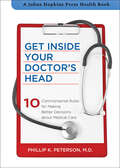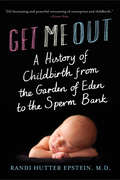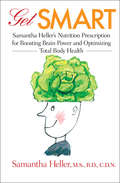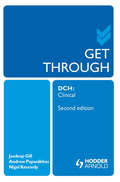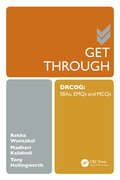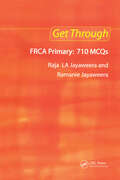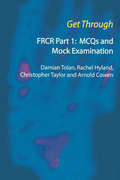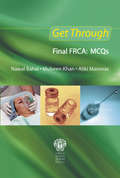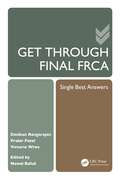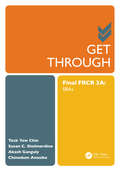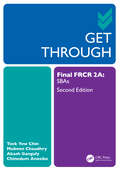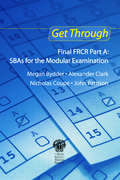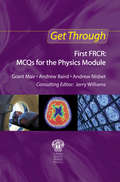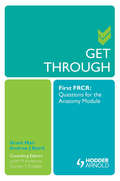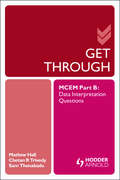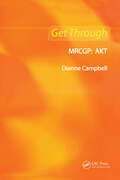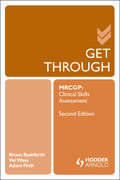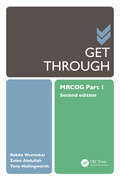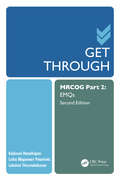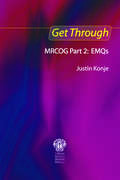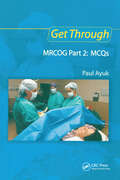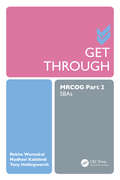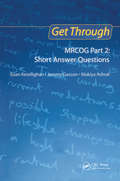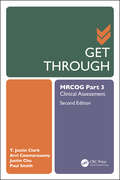- Table View
- List View
Get Inside Your Doctor's Head: 10 Commonsense Rules for Making Better Decisions about Medical Care (A Johns Hopkins Press Health Book)
by MD Phillip K. PetersonThis concise and accessible guide to modern healthcare explains the 10 rules of medical decision-making—and when to break them.With so many medical tests and treatments to consider and so much information out there—some of it contradictory—it can be difficult to know what’s right for you. In Get Inside Your Doctor’s Head, Dr. Phillip K. Peterson explains the Ten Rules of Internal Medicine. Using real case examples, Peterson shows how following these commonsense rules will help you make better decisions about your medical care.Get Inside Your Doctor’s Head provides advice about when to seek treatment, when to get another opinion, and when to let time take its course. Using the Ten Rules can help you communicate more effectively with doctors and help you weigh their recommendations. As with all rules, there are occasional exceptions—and when evidence suggests that you are an exception, the relevant rule should be broken. Follow the Ten Rules to make decisions in the increasingly complicated medical world when you need guidance about health matters for yourself and your loved ones.
Get Inside Your Doctor's Head: Ten Commonsense Rules for Making Better Decisions about Medical Care (A Johns Hopkins Press Health Book)
by Phillip K. PetersonTen rules of medical decision making—and when to break them.Second Place Winner of the Design and Effectiveness Award of the Washington PublishersWith so many medical tests and treatments and so much scientific and medical information—some of it contradictory—how can people make the best medical decisions?Most medical decisions, it turns out, are based on common sense. In this short and easy-to-read book, Dr. Phillip K. Peterson explains the ten rules of internal medicine. Using real case examples he shows how following the rules will help consumers make good decisions about their medical care.Get Inside Your Doctor’s Head provides advice about such questions as when to seek treatment, when to get another opinion, and when to let time take its course. Turn to the Ten Rules when you are weighing your doctor’s recommendations about diagnostic tests and treatments and use them to communicate more effectively with your doctor. As with all rules, the Ten Rules of Internal Medicine have occasional exceptions—and when evidence suggests that you are an exception, the relevant rule should be broken. Follow the Ten Rules to make decisions in the increasingly complicated medical world when you need guidance about health matters for yourself and your loved ones.
Get Me Out: A History of Childbirth from the Garden of Eden to the Sperm Bank
by Randi Hutter Epstein"[An] engrossing survey of the history of childbirth."--Stephen Lowman, Washington Post Making and having babies--what it takes to get pregnant, stay pregnant, and deliver--have mystified women and men throughout human history. The insatiably curious Randi Hutter Epstein journeys through history, fads, and fables, and to the fringe of science. Here is an entertaining must-read--an enlightening celebration of human life.
Get Smart: Samantha Heller's Nutrition Prescription for Boosting Brain Power and Optimizing Total Body Health
by Samantha HellerA healthy body makes for a healthy brain, and this fun, creative guide is designed to help readers have both—they can be smarter, stronger, happier, and more energetic by changing a few dietary habits. Nutritionist and frequent morning talk show guest Samantha Heller has created a life raft in a sea of confusing and contradictory nutrition and diet information. Heller's Nutrition Prescription plan considers each person’s habits, budget, and food preferences when making lifestyle recommendations. Raised on white rice and beans? Switch to brown rice instead. Can’t afford fresh Atlantic salmon? Canned salmon will do just as well. Fresh vegetables unavailable at the neighborhood bodega? Frozen are just as nutritious. Heller's unique, user-friendly approach is based on the most current scientific and medical research, while her food lists, meal plans, substitutions, and recipes are easy to follow. Heller links the benefits of good nutrition to healthy brain functioning, explaining how readers can improve memory, focus, mood, mental clarity, heart health, psychological well-being, and energy levels—all through a healthy diet and regular exercise. Get Smart will motivate and empower people of all ages to change their lives.
Get Through DCH Clinical 2E (Get Through)
by Andrew Papanikitas Jasdeep Gill Nigel KennedyWith a heavily revised format in consideration of the recent DCH clinical examination changes, this new edition of the comprehensive revision guide provides the candidate with a definitive, one-stop revision resource.Familiarise yourself with the revised format of the examination, including revised timingsLearn your revision needs through plentiful
Get Through DRCOG: SBAs, EMQs and McQs (Get Through Ser.)
by Rekha Wuntakal Madhavi KalidindiThe book provides advice on how to prepare for the examination and how questions should be approached to obtain the highest marks. With more than 350 questions, preparation tips and extensive answer explanations, it is the definitive resource for those attempting the DRCOG. The book is comprehensive and authoritative: written by an experienced author and overseen by a well-respected expert in the field. It is the essential revision guide for those preparing for this examination.
Get Through FRCA Primary: 710 MCQs (Get Through)
by Raja L JayaweeraGet Through FRCA Primary: 710 MCQs is written for all candidates undertaking the FRCA Primary examination. The authors have focussed on the most daunting parts of the examination syllabus, namely, physiology, pharmacology, clinical chemistry and physics. The text is divided into two sections: the first part consists of 260 MCQs grouped by subject; the second part comprises five sample papers, each containing 90 MCQs. This format is identical to the FRCA Primary exam, thus making this book an ideal learning format.The authors, Raja Jayaweera and Ramanie Jayaweera, between them have wide experience of the FRCA examinations and are particularly aware of the standard of knowledge required to pass this initial Primary MCQ exam.Recommended to all candidates preparing for the FRCA examinations, their trainers and qualified anaesthetists wishing to update their knowledge. Containing MCQs covering all of the tricky topics of the actual exam, this is one text that all candidates for the FRCA exam cannot be without.
Get Through FRCR Part 1: MCQs and Mock Examination
by Chris Taylor Damian Tolan Rachel Hyland Arnold CowenGet Through FRCR Part 1: MCQs and Mock Examination is the essential and highly praised revision aid for the Royal College of Radiologists' FRCR Part 1 exam. Providing comprehensive coverage of the new FRCR Part 1 syllabus, this title presents questions in a similar style to the exam, accompanied by detailed yet uncomplicated explanations. Paying special attention to legislation, this book also covers recent advances in the field and radiation protection issues. Get Through FRCR Part 1 is ideal for FRCR candidates and tutors, radiographers, radiologists and medical physics students.
Get Through Final FRCA: MCQs (Get Through)
by Nawal Bahal Mubeen Khan Aliki ManorasWith more than 950 questions, and containing diagrams found in the actual exam, this book encompasses the syllabus of the Final FRCA as set by the Royal College of Anaesthetists, including five complete examinations, each comprising of 90 MCQs. Questions have been modelled on actual exam questions so that they accurately reflect the style and level
Get Through Final FRCA: Single Best Answers
by Desikan Rangarajan Prabir Patel Victoria WroeA comprehensive revision guide, Get Through Final FRCA: Single Best Answers provides candidates with a definitive resource to aid passing their challenging Final FRCA written examination.This latest edition contains 180 new SBA questions along with detailed answer justifications. The questions have been completely updated to follow the current form
Get Through Final FRCR 2A: SBAs (Get Through)
by Teck Yew Chin Akash Ganguly Chinedum AnosikeThis is the first revision guide to map directly to the new structure of the FRCR Final Part A examination (CR2A). Spanning a broad range of topics, the book follows the core clinical radiology curriculum, covering all modalities. It is divided into 7 test papers, consisting of 120 mixed SBA-type questions with detailed answers in sequential order. Every answer is followed by a short explanation and relevant discussion around the topic with appropriate references. Each paper should take three hours to complete. Delivering over 20 hours of focused exam practice, this guide is a sound investment for trainee radiologists preparing for their Final Part A exam.
Get Through Final FRCR 2A: SBAs (Get Through)
by Teck Yew Chin Akash Ganguly Chinedum Anosike Mubeen ChaudhryThis is the first revision guide to map directly to the new structure of the FRCR Final Part A examination (CR2A). Spanning a broad range of topics, the second edition follows the core clinical radiology curriculum, covering all modalities. It is divided into seven test papers, consisting of 120 mixed SBA-type questions, each with detailed answers in sequential order. The content has been updated in line with question stems from recent examinations. There are also topics which introduce core concepts of artificial intelligence (AI), given its growing emphasis in radiology and its recent introduction into the Royal College of Radiologists curriculum. Every answer is followed by a short explanation and relevant discussion around the topic with appropriate references. Each paper should take three hours to complete.Delivering over 20 hours of focused exam practice, this guide is a sound investment for trainee radiologists preparing for their Final Part A exam.
Get Through Final FRCR Part A: SBAs for the Modular Examination (Get Through)
by Alexander Clark John Pattison Megan Bydder Nicholas CoupeReflecting the latest change to the exam, the introduction of single best answer questions (SBAs), this book is completely up to date and offers a valuable insight into the new exam format. Providing candidates with a wealth of practice questions and organized by subject matter into the modular format, this comprehensive collection of practice SBAs
Get Through First FRCR: MCQs for the Physics Module (Get Through)
by Andrew Nisbet Grant Mair Andrew BairdCompletely up to date with the latest examination changes, Get Through First FRCR: MCQs for the Physics Module offers a valuable insight into the new Physics module of the First FRCR examination. Over 200 5-part True/False MCQs are presented according to syllabus topics, accurately reflecting the content, style and level of difficulty of the actual examination questions.
Get Through First FRCR: Questions for the Anatomy Module (Get Through)
by Judith Anderson Grant Mair Andrew Baird Gordon FindlaterCompletely up to date with the latest exam changes, Get Through First FRCR: Questions for the Anatomy Module offers a valuable insight into the new anatomy exam. 170 high quality practice cases, each containing 5 question stems, are presented according to syllabus topics, accurately reflecting the content, style and level of difficul
Get Through MCEM Part B: Data Interpretation Questions (Get Through)
by Matthew Hall Sam Thanabadu Chetan TrivedyThe only book dedicated to the College of Emergency Medicine's Membership examination, this book contains numerous questions and answers, together with data sets and clinical examples to help prepare candidates taking part B of this and other higher examinations in emergency medicine.All trainees wishing to pursue a career in Emergency Medicine hav
Get Through MRCGP: AKT (Get Through)
by Dianne CampbellGet Through MRCGP: AKT provides prospective candidates with a wealth of practice material for this relatively new examination, covering all the different question types that are encountered in the actual examination. The questions are divided into papers for ease of use, and, in order to give the reader a really useful revision experience, the author has concentrated on the themes and subjects which candidates often answer poorly. It is improvement in a candidate's areas of weakness which will allow them to pass the exam. To this end, the author has included extended explanations in the answers section, especially in subjects where candidates often perform poorly. This allows candidates to gain confidence answering these more challenging questions, which may be the crucial ones in any exam.Providing the reader with an invaluable bank of material to help them achieve success in this exam, Get Through MRCGP: AKT is an essential revision guide for all GPs preparing for the Applied Knowledge Test.
Get Through MRCGP: Clinical Skills Assessment 2E (Get Through)
by Bruno Rushforth Valerie Wass Adam FirthCompletely revised and including new additional material, this second edition of the bestselling Get Through MRCGP: Clinical Skills Assessment provides candidates with a definitive, one-stop revision resource for the CSA part of the MRCGP examination. Written by an experienced author team with extensive knowledge of both national and international primary care clinical skills assessment, this book is essential reading for postgraduate candidates preparing for this challenging examination.
Get Through MRCOG Part 1 (Get Through)
by Tony Hollingworth Rekha Wuntakal Ziena AbdullahGet Through MRCOG Part 1, Second Edition, provides a selection of questions covering the basic and applied sciences relevant to the clinical practice of obstetrics and gynaecology and mapped to the RCOG Knowledge Areas in the MCQ style. With appropriate explanations of the answers and references to the relevant guidelines, this is a definitive resource for those taking the MRCOG Part 1 examination.
Get Through MRCOG Part 2: EMQS (Get Through)
by Kalaivani Ramalingam Latha Mageswari Palanivelu Lakshmi ThirumalaikumarThis book provides those studying for the MRCOG Part 2 examination with welcome practice in answering Extended Matching Questions (EMQs). Updated throughout to map onto the MRCOG syllabus from September 2016, the book is designed to test the candidate's theoretical and practical knowledge of obstetrics and gynaecology. An introductory section on exam techniques is followed by a collection of 41 EMQ themes, split into obsterics and gynaecology. The questions are based on common clinical scenarios and cover a variety of topics. Answers are included after each topic, and these include explanatory material and useful references.
Get Through MRCOG Part 2: EMQs (Get Through)
by Justin C KonjeModelled on the current MRCOG syllabus, Get Through MRCOG Part 2: EMQs is designed to test candidates' theoretical and practical knowledge of obstetrics and gynaecology. The book opens with an introductory section explaining the format of the examination, providing advice on how to prepare for it and how EMQs should be approached in order to obtain
Get Through MRCOG Part 2: MCQs (Get Through)
by Paul AyukGet Through MRCOG Part 2: MCQs covers the breadth and depth of the MRCOG Part 2 examination syllabus and is an essential revision tool for candidates preparing for this examination. The comprehensive and wide collection of practice questions is designed to help the candidate test and assess their knowledge of the subject, aiding them in thorough preparation for the exam.The text contains 750 multiple choice stems, each with around four associated questions, providing the reader with a total of 3000 individual questions with which to test themselves. The material is divided up by subject area, allowing candidates to test their knowledge on a particular topic. The 13 'modules' are followed by two mock papers, each containing a selection of questions on different subject areas, which the reader can attempt under timed conditions. Answers are provided, with useful explanatory information for all questions to help the reader understand why their answer is right or wrong.The author, Paul Ayuk, was clinical lecturer in obstetrics and gynaecology at Oxford University for 6 years and has run an on-line MRCOG course for over 5 years, assisting over 8000 candidates worldwide.
Get Through MRCOG Part 2: SBAs (Get Through)
by Tony Hollingworth Rekha Wuntakal Madhavi KalidindiGet Through MRCOG Part 2: SBAs provides 3 exams' worth of questions mapped to the RCOG syllabus in the newly introduced SBA style. With detailed explanations and relevant references to guidelines, this is the definitive resource for those taking the MRCOG Part 2 examination.
Get Through MRCOG Part 2: Short Answer Questions (Get Through Ser.)
by Euan Kevelighan Jeremy Gasson Makiya AshrafGet Through MRCOG Part 2: Short Answer Questions is an essential revision guide for candidates preparing for the MRCOG Part 2 exam. This comprehensive collection of practice Short Answer Questions (SAQs) is designed to help candidates test and assess their own knowledge, aiding thorough preparation for the exam.The book opens with an introduction to the exam and includes advice on how to prepare for it, information on what to expect, and guidance on how to write excellent answers. This is followed by two sections: the first provides a wide range of SAQs divided into obstetric and gynaecological topics, and the second presents six practice exams set out in the format of the actual exam. For each question, the authors highlight the key words in the question, followed by a brief essay plan and then give a worked example answer. The specimen answers indicate how many marks the candidate would obtain for each point made, and are supplemented with valuable extra information and further reading, to enhance understanding and aid further revision.
Get Through MRCOG Part 3: Clinical Assessment, Second Edition (Get Through)
by Paul Smith Arri Coomarasamy T. Justin Clark Justin ChuThis study guide offers a systematic, comprehensive and focused approach to preparation for the MRCOG Part 3 Clinical Assessment exam. After an initial introduction, the text divides by OSCE station, beginning with an analysis of what the station is testing and what approaches and preparation are required, supported by tips and examples; this is followed by thoroughly worked practice questions based upon the exam format, with an analysis of how these are likely to be marked. Practice exam 'circuits' with fully worked questions and answers conclude the book.
